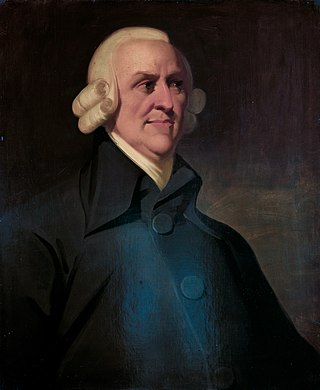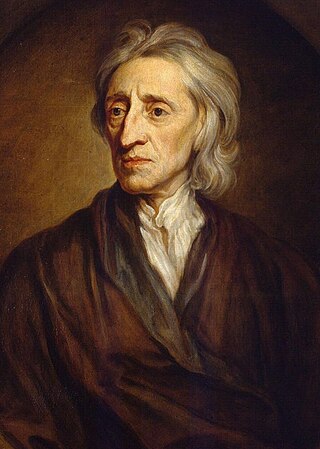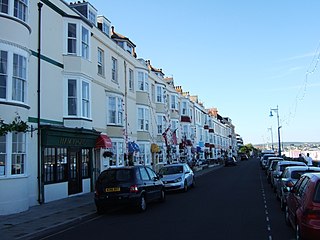Related Research Articles

Adam Smith was a Scottish economist and philosopher who was a pioneer in the thinking of political economy and key figure during the Scottish Enlightenment. Seen by some as "The Father of Economics" or "The Father of Capitalism", he wrote two classic works, The Theory of Moral Sentiments (1759) and An Inquiry into the Nature and Causes of the Wealth of Nations (1776). The latter, often abbreviated as The Wealth of Nations, is considered his magnum opus and the first modern work that treats economics as a comprehensive system and as an academic discipline. Smith refuses to explain the distribution of wealth and power in terms of God's will and instead appeals to natural, political, social, economic and technological factors and the interactions between them. Among other economic theories, the work introduced Smith's idea of absolute advantage.
Classical liberalism is a political tradition and a branch of liberalism that advocates free market and laissez-faire economics; civil liberties under the rule of law with especial emphasis on individual autonomy, limited government, economic freedom, political freedom and freedom of speech. It gained full flowering in the early 18th century, building on ideas stemming at least as far back as the 13th century within the Iberian, Anglo-Saxon, and central European contexts and was foundational to the American Revolution and "American Project" more broadly.

John Locke was an English philosopher and physician, widely regarded as one of the most influential of Enlightenment thinkers and commonly known as the "father of liberalism". Considered one of the first of the British empiricists, following the tradition of Francis Bacon, Locke is equally important to social contract theory. His work greatly affected the development of epistemology and political philosophy. His writings influenced Voltaire and Jean-Jacques Rousseau, and many Scottish Enlightenment thinkers, as well as the American Revolutionaries. His contributions to classical republicanism and liberal theory are reflected in the United States Declaration of Independence. Internationally, Locke’s political-legal principles continue to have a profound influence on the theory and practice of limited representative government and the protection of basic rights and freedoms under the rule of law.

Property is a system of rights that gives people legal control of valuable things, and also refers to the valuable things themselves. Depending on the nature of the property, an owner of property may have the right to consume, alter, share, redefine, rent, mortgage, pawn, sell, exchange, transfer, give away, or destroy it, or to exclude others from doing these things, as well as to perhaps abandon it; whereas regardless of the nature of the property, the owner thereof has the right to properly use it under the granted property rights.

The Fourth Amendment to the United States Constitution is part of the Bill of Rights. It prohibits unreasonable searches and seizures. In addition, it sets requirements for issuing warrants: warrants must be issued by a judge or magistrate, justified by probable cause, supported by oath or affirmation, and must particularly describe the place to be searched and the persons or things to be seized.
Private property is a legal designation for the ownership of property by non-governmental legal entities. Private property is distinguishable from public property, which is owned by a state entity, and from collective or cooperative property, which is owned by a group of non-governmental entities.

Wealth is the abundance of valuable financial assets or physical possessions which can be converted into a form that can be used for transactions. This includes the core meaning as held in the originating Old English word weal, which is from an Indo-European word stem. The modern concept of wealth is of significance in all areas of economics, and clearly so for growth economics and development economics, yet the meaning of wealth is context-dependent. An individual possessing a substantial net worth is known as wealthy. Net worth is defined as the current value of one's assets less liabilities.
The Virginia Declaration of Rights was drafted in 1776 to proclaim the inherent rights of men, including the right to reform or abolish "inadequate" government. It influenced a number of later documents, including the United States Declaration of Independence (1776) and the United States Bill of Rights (1789).
In Ethics and political philosophy, in social contract theory, religion, and international law, the term State of Nature describes the hypothetical way of life that existed before people organised themselves into societies. Philosophers of the state of nature theory propose that there was an historical period before societies existed, and seek answers to the questions: What was life like before civil society?, How did government emerge from such a primitive start?, and What are the hypothetical reasons for entering a state of society by establishing a nation-state?

The Virginia Plan was a proposal to the United States Constitutional Convention for the creation of a supreme national government with three branches and a bicameral legislature. The plan was drafted by James Madison while he waited for a quorum to assemble at the Constitutional Convention of 1787.
Geolibertarianism is a political and economic ideology that integrates libertarianism with Georgism. It favors a taxation system based on income derived from land and natural resources instead of on labor, coupled with a minimalist model of government, as in libertarianism.

An Inquiry into the Nature and Causes of the Wealth of Nations, generally referred to by its shortened title The Wealth of Nations, is the magnum opus of the Scottish economist and moral philosopher Adam Smith. First published in 1776, the book offers one of the world's first collected descriptions of what builds nations' wealth, and is today a fundamental work in classical economics. By reflecting upon the economics at the beginning of the Industrial Revolution, the book touches upon such broad topics as the division of labour, productivity, and free markets.

Two Treatises of Government is a work of political philosophy published anonymously in 1689 by John Locke. The First Treatise attacks patriarchalism in the form of sentence-by-sentence refutation of Robert Filmer's Patriarcha, while the Second Treatise outlines Locke's ideas for a more civilized society based on natural rights and contract theory. The book is a key foundational text in the theory of Liberalism.

The Constitutional Convention took place in Philadelphia from May 25 to September 17, 1787. Although the convention was intended to revise the league of states and first system of government under the Articles of Confederation, the intention from the outset of many of its proponents, chief among them James Madison of Virginia and Alexander Hamilton of New York, was to create a new Frame of Government rather than fix the existing one. The delegates elected George Washington of Virginia, former commanding general of the Continental Army in the late American Revolutionary War (1775–1783) and proponent of a stronger national government, to become President of the convention. The result of the convention was the creation of the Constitution of the United States, placing the Convention among the most significant events in American history.
The right to property, or the right to own property is often classified as a human right for natural persons regarding their possessions. A general recognition of a right to private property is found more rarely and is typically heavily constrained insofar as property is owned by legal persons and where it is used for production rather than consumption.
Lectures on Jurisprudence, also called Lectures on Justice, Police, Revenue and Arms (1763) is a collection of Adam Smith's lectures, comprising notes taken from his early lectures. It contains the formative ideas behind The Wealth of Nations.

The position that taxation is theft, and therefore immoral, is found in a number of political philosophies considered radical. It marks a significant departure from conservatism and classical liberalism. This position is often held by anarcho-capitalists, objectivists, most minarchists, anarchists, right-wing libertarians, and voluntaryists.
Liberalism is a political and moral philosophy based on the rights of the individual, liberty, consent of the governed, political equality and equality before the law. Liberals espouse various views depending on their understanding of these principles. However, they generally support private property, market economies, individual rights, liberal democracy, secularism, rule of law, economic and political freedom, freedom of speech, freedom of the press, freedom of assembly, and freedom of religion. Liberalism is frequently cited as the dominant ideology of modern history.
Economic liberalism is a political and economic ideology that supports a market economy based on individualism and private property in the means of production. Adam Smith is considered one of the primary initial writers on economic liberalism, and his writing is generally regarded as representing the economic expression of 19th-century liberalism up until the Great Depression and rise of Keynesianism in the 20th century. Historically, economic liberalism arose in response to feudalism and mercantilism.

In political science, the term Class conflict identifies the political tension and economic antagonism that exist among the social classes a society, because of socio-economic competition for resources among the social classes, between the rich and the poor. In the political and economic philosophies of Karl Marx and Mikhail Bakunin, class struggle is a central tenet and a practical means for effecting radical sociopolitical changes for the social majority, the working class.
References
- ↑ Brodeur, Jean-Paul (1992). "High Policing and Low Policing: Remarks about the Policing of Political Activities". In Kevin R. E. McCormick; Livy A. Visano (eds.). Understanding Policing. Canadian Scholars’ Press. pp. 284–285, 295. ISBN 1-55130-005-2.
- ↑ Walker, Samuel (1977). A Critical History of Police Reform: The Emergence of Professionalism. Lexington, MT: Lexington Books. p. 143. ISBN 978-0-669-01292-7.
- ↑ Neocleous, Mark (2004). Fabricating Social Order: A Critical History of Police Power. Pluto Press. pp. 93–94. ISBN 978-0-7453-1489-1.
- ↑ Siegel, Larry J. (2005). Criminology . Thomson Wadsworth. pp. 515, 516.
- ↑ "Governments Secure Wealth to Defend the Rich from the Poor - Research Paper - Roijster". studymode.com. Retrieved 2015-08-04.
- ↑ "John Locke: Second Treatise of Civil Government: Chapter 9". constitution.org. Retrieved 2015-08-04.
- ↑ Adam Smith - An Inquiry into the Nature and Causes of the Wealth of Nations - The Adam Smith Institute
- ↑ http://www.bartleby.com/73/764.html Frank Monaghan, John Jay, chapter 15, p. 323 (1935)
- ↑ Elliot, J.; Madison, J.; United States. Constitutional Convention (1891). The Debates in the Several State Conventions on the Adoption of the Federal Constitution, as Recommended by the General Convention at Philadelphia, in 1787: Together with the Journal of the Federal Convention, Luther Martin's Letter, Yates's Minutes, Congressional Opinions, Virginia and Kentucky Resolutions of '98-'99, and Other Illustrations of the Constitution ... J. B. Lippincott Company. p. 450. Retrieved 2015-08-04.
- ↑ Potter, Gary. "The History of Policing in the United States".